This year’s ICSH National Social Housing Conference (sponsored by AIB) From Vision to Reality: Transforming Communities Through Placemaking with Social and Affordable Housing, took place in Clayton Whites Hotel in Wexford on October 18th and 19th. The focus was on placemaking and the role of social housing in creating vibrant communities, revitalising urban and rural neighbourhoods and adding value through innovative design, management, inclusion and engagement. A record 400+ delegates attended. This year we moved away from PowerPoint driven presentations, focusing instead on speakers’ personal inputs and vibrant panel and QandA interaction during each session. Feedback was very positive from delegates, who felt that this approach was more interesting and engaging.
Wednesday 18 October
9.30am – Welcome by ICSH President, Tina Donaghy
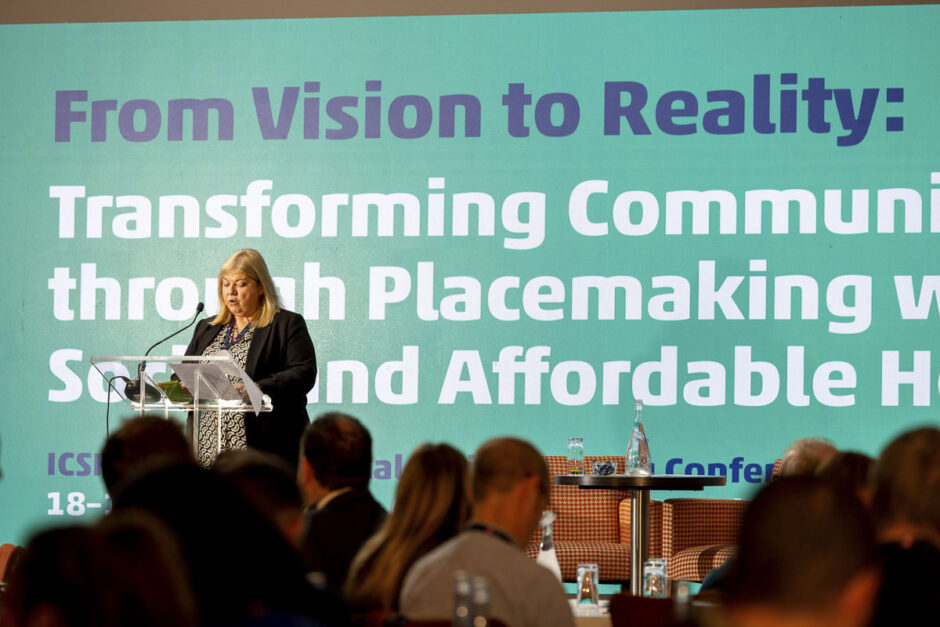
9.45am – Ministerial address
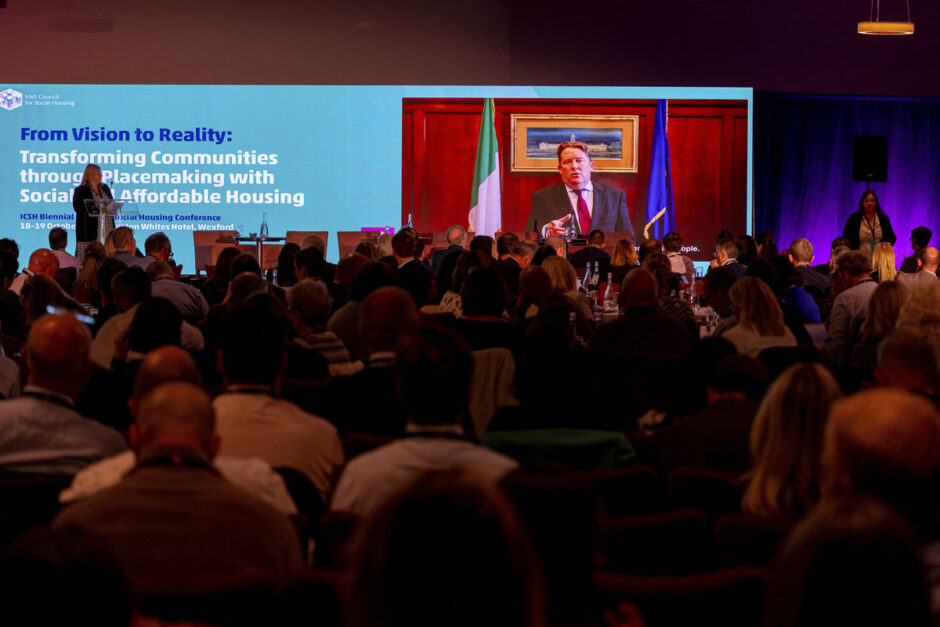
10am Placemaking: realising the potential of social and affordable housing to build communities
The first session Placemaking: realising the potential of social and affordable housing to build communities introduced Ramon Marrades, Director, Placemaking Europe, who importantly used broad brushstrokes to describe Placemaking, identifying three dimensions of placemaking urbanism: 1. right to the city; 2. experimentation/innovation; 3. thinking long-term urban strategy. Ramon said balancing these three considerations is required to manage the long-term value of places. Sharon Cosgrove of Oaklee Housing highlighted the importance of tenant engagement and initiatives that build community. Alison O’Rourke, Senior Executive Officer, Cork City Council flagged the significance of the pedestrianisation of Princes St Cork, ‘The project brought the town back into people’s minds. People had forgotten about their city. She said good placemaking is always collaborative. Karen Kenny, Senior Advisor (Planning) at the Department of Housing, Local Government and Heritage focused on the new Planning and Development Bill and creating a system that supports greater clarity and consistency, that builds confidence overall. She said sustainable and compact settlement guidelines will set national planning policy with a focus on residential development. Anne Marie O’Connor (OPR) flagged that most county and city development plans have been reviewed with a view of the policy context (from the National Planning Framework). She said it was important for those using development plans to get involved in the placemaking process, which is about the relationship between people and their environment. She highlighted the importance of building climate resilience into the design stage of schemes, biodiversity, transport oriented investment, walking and cycling infrastructure and embedding sustainability and resilience.
Chair: Aidan Culhane, Chief Executive, The Iveagh Trust
- Ramon Marrades, Director, Placemaking Europe
- Anne Marie O’Connor, Deputy Regulator and Director of Evaluations of Local Authority Plans, Office of the Planning Regulator
- Sharon Cosgrove, Chief Executive, Oaklee Housing
- Karen Kenny, Senior Advisor – Planning, Department of Housing, Local Government and Heritage
- Alison O’Rourke, Senior Executive Officer, Cork City Council


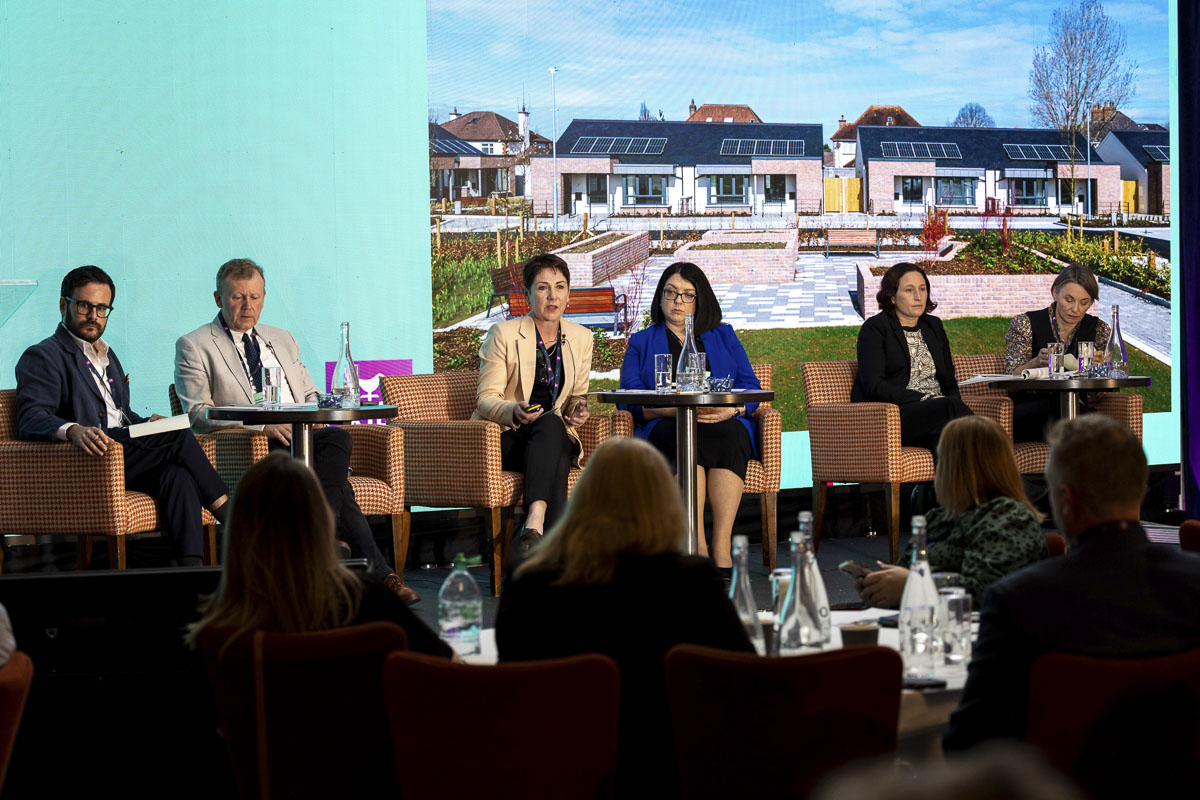
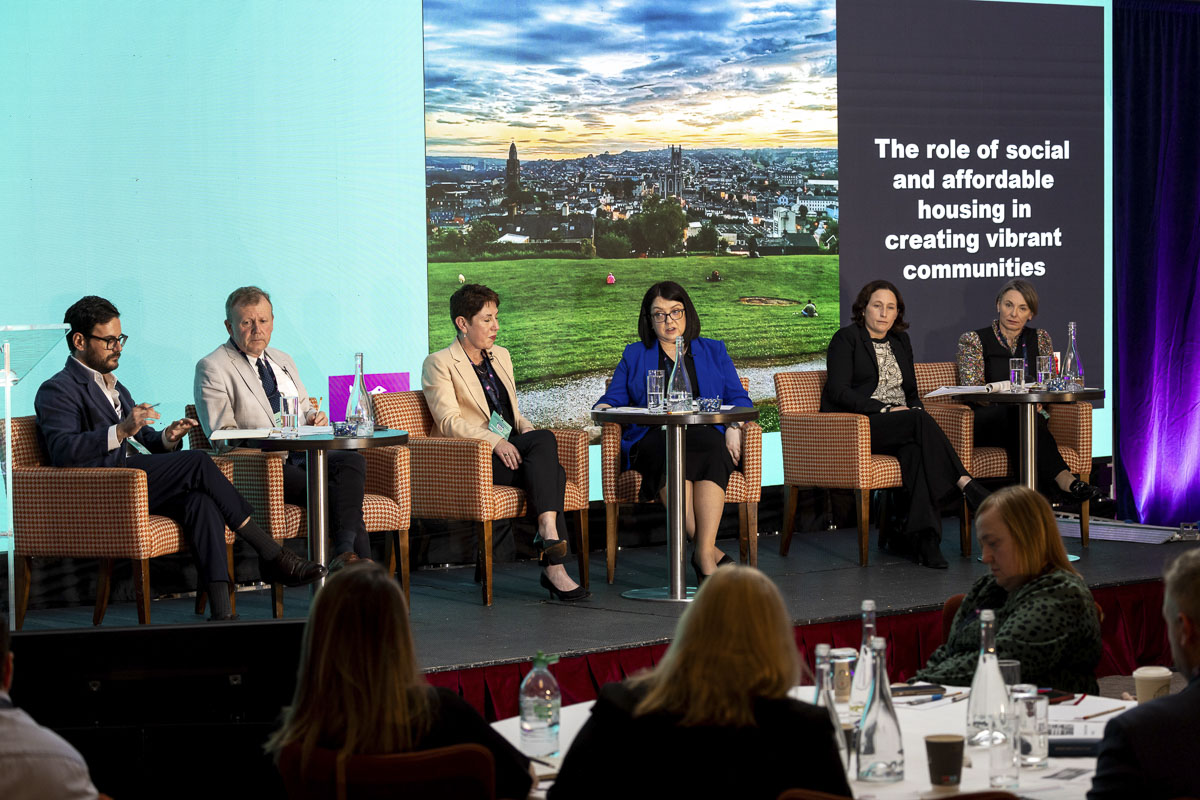
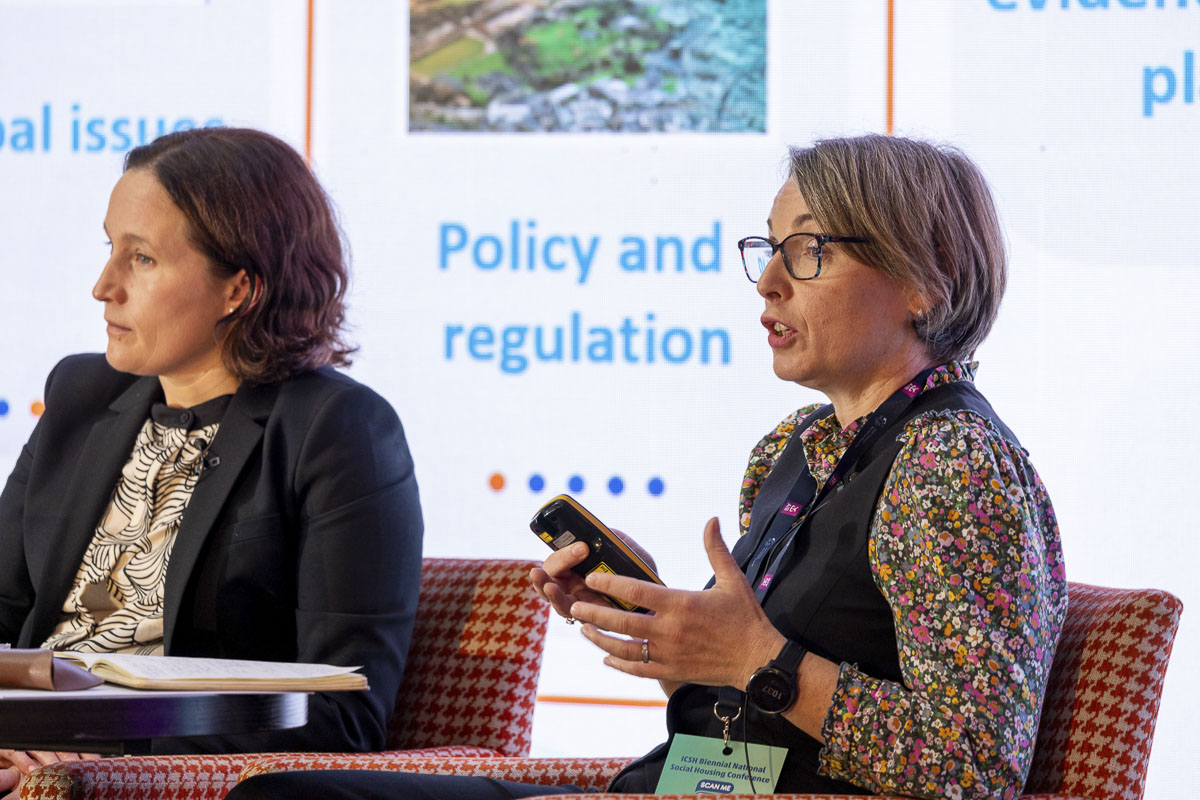

11.45am: Creating communities in place of dereliction
The second session Creating communities in place of dereliction was chaired by Philip Crowe who said that these were interesting times in terms of the pedagogy of the built environment. He flagged the challenges around the adaptive reuse of vacant site and the importance of using brownfield sites well. Bronagh D’Arcy presented a number of Tuath case studies: Ellis Court, Benburb St. Dublin 7, The Plaza Parkwest, Dublin 12 and Springville House Blackrock, Cork City. In the case of the commercial to residential refit of Parkwest Plaza, Tuath are looking at an 82% embodied carbon reduction and whole life carbon reduction of 62%. Eimear Cody presented on an impressive number of challenging regeneration and preservation projects in Kilkenny City and county that have responded sensitively to the historical building footprint. With a focus on creating communities, Kath Cottier spoke about tenant engagement, the role of landlord and the needs of residents. She used the platform to communicate the voice of residents as well as reflecting on her own tenant engagement journey during her career in housing. Amy McKeogh reflected on the successes of the Design POP festival in Cork City, which celebrates leading architecture and design through a series of pavilions, events, lectures, and exhibitions. The festival is very much about community and collaboration.
Chair: Philip Crowe, Assistant Professor, School of Architecture, Planning and Environmental Policy, UCD
- Bronagh D’Arcy, Deputy CEO, Tuath Housing
- Eimear Cody, Senior Engineer, Housing Capital, Kilkenny County Council
- Amy McKeogh, Founding and Creative Director, Design POP
- Kathleen Cottier, Chief Executive Officer, Fold Ireland
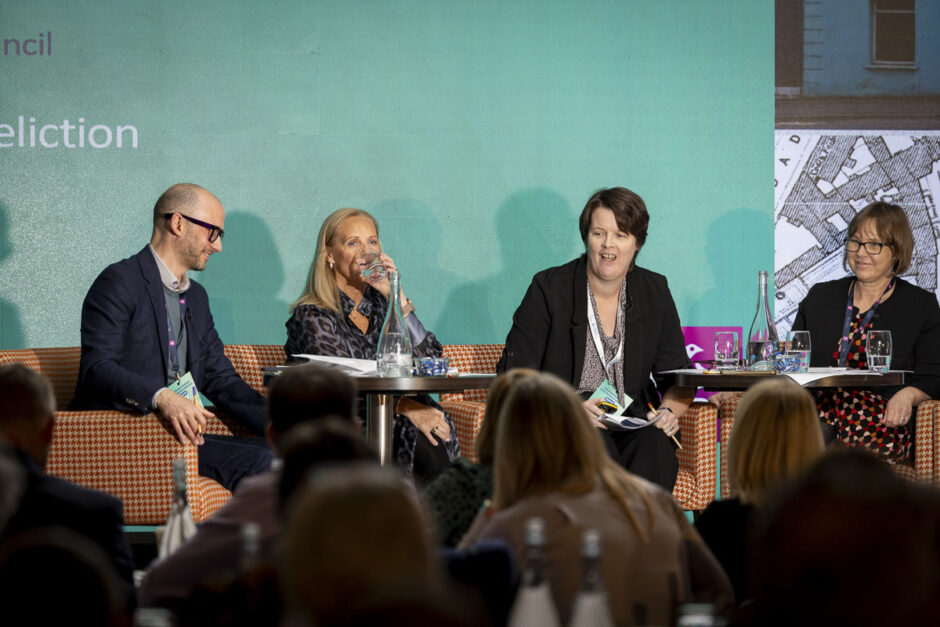
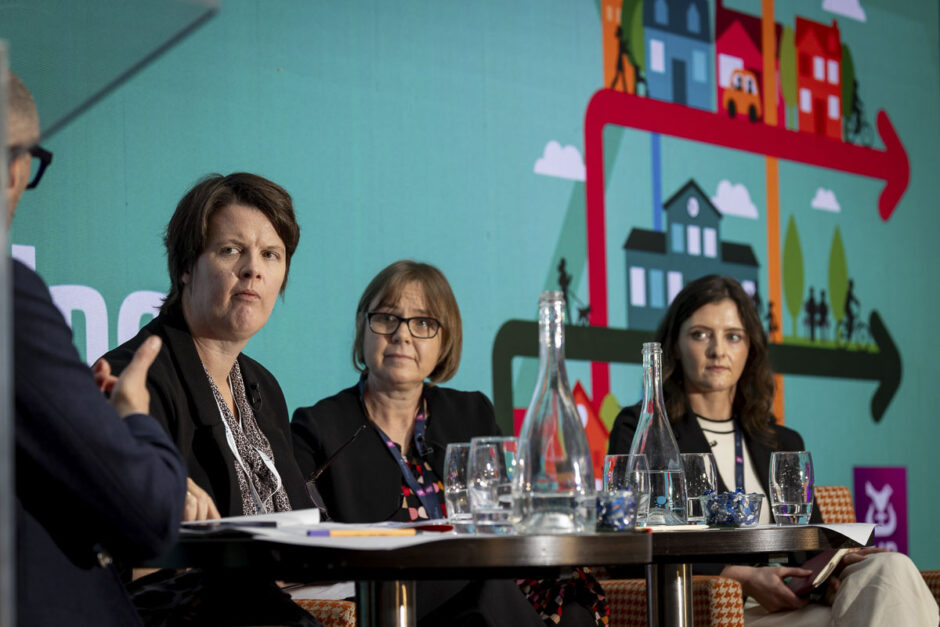
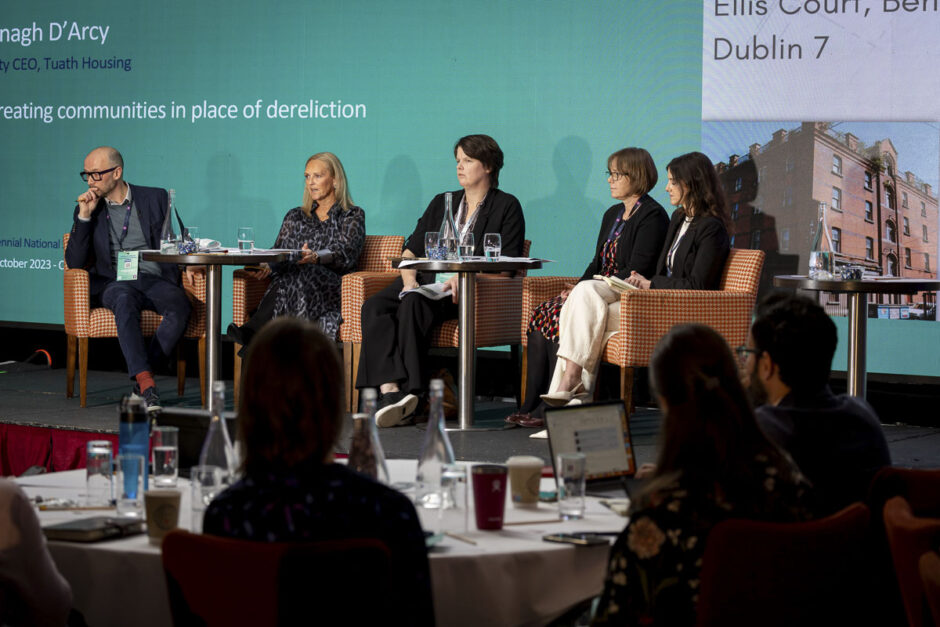
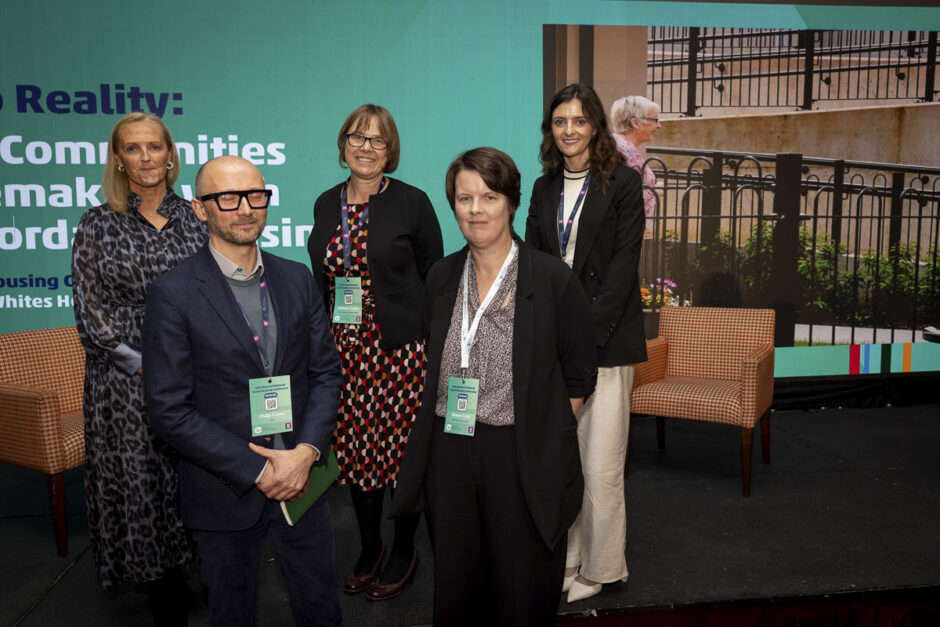
2pm: Partnership working to deliver housing with supports in the heart of communities
The third session Partnership working to deliver housing with supports in the heart of communities, chaired by Declan Dunne of Respond, introduced Frank van Dillen who stated that governments were in denial about the social crisis caused by an ageing society. He called for paradigm shifts in housing and care: from care to prevention and inclusion, from one size fits all to lifestyle oriented. Denise Tighe spoke of our ageing population and the challenges in terms of delivery. She said healthcare can’t provide for all the needs of a population. She said the population of 65+ is growing by 3% annually. People want to live in their own homes, but the population of informal carers facilitating people to stay in their communites is not growing at the same rate. Clare Naughton highlighted the importance of collaboration working, but that we need to redouble our efforts with an expanding population. Jean Coleman reminded delegates of the excellent IWA campaign ‘Think Ahead. Think Housing’, and that disability housing is a crisis within a crisis. There are currently 1300 people under 65 living in nursing homes. we need more wheelchair liveable housing. She said we need to see more UD+ and UD++ homes, as well as personal assistant packages to make things possible. Martina Smith flagged HAIL’s tenancy sustainment project with 50% Dept housing and 50% HSE funding. There are the ongoing challenges of a partnership model, but key to it all is a complete focus on tenants and clients. Martina called for a reasonable percentage of Part Vs to be allocated for disabled housing and, at the same time, she highlighted that current CAS funding was not viable in the long-term. It’s a funding model that suits special needs, but one that came about at a time when costs were lower.
Chair: Declan Dunne, Chief Executive Officer, Respond
- Frank van Dillen, Partner, DVA, Dementia Village Associates, Netherlands
- Denise Tighe General Manager change HSE
- Clare Naughton, Social Inclusion Unit, Department of Housing, Local Government and Heritage
- Jean Coleman, National Housing Programme Manager, Irish Wheelchair Association
- Martina Smith, Chief Executive, HAIL

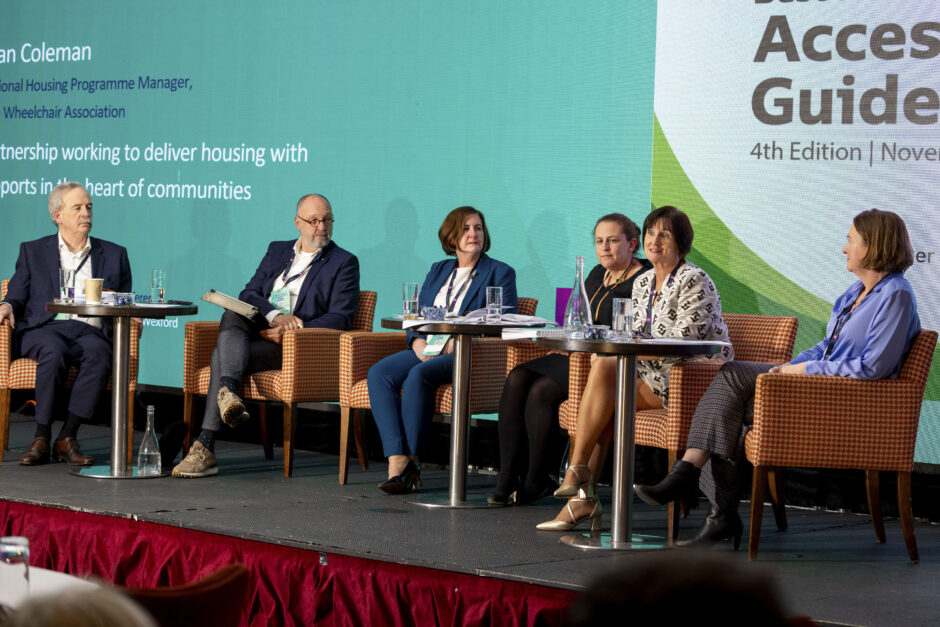
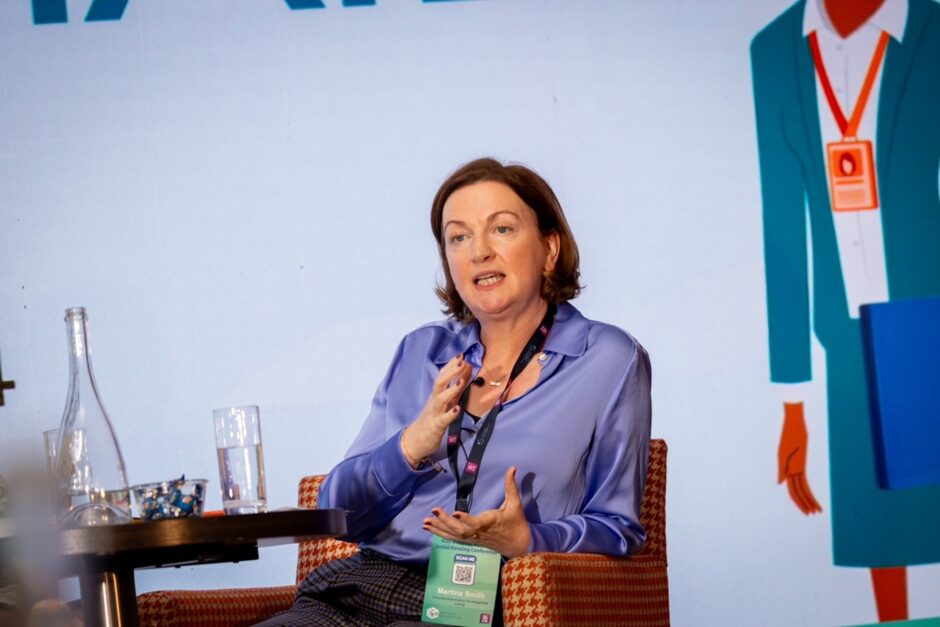
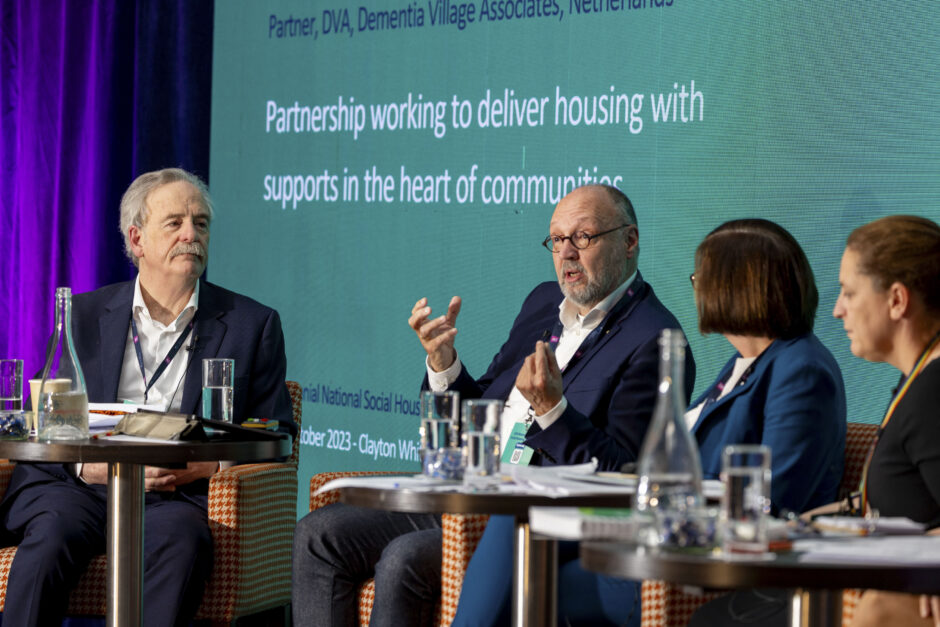
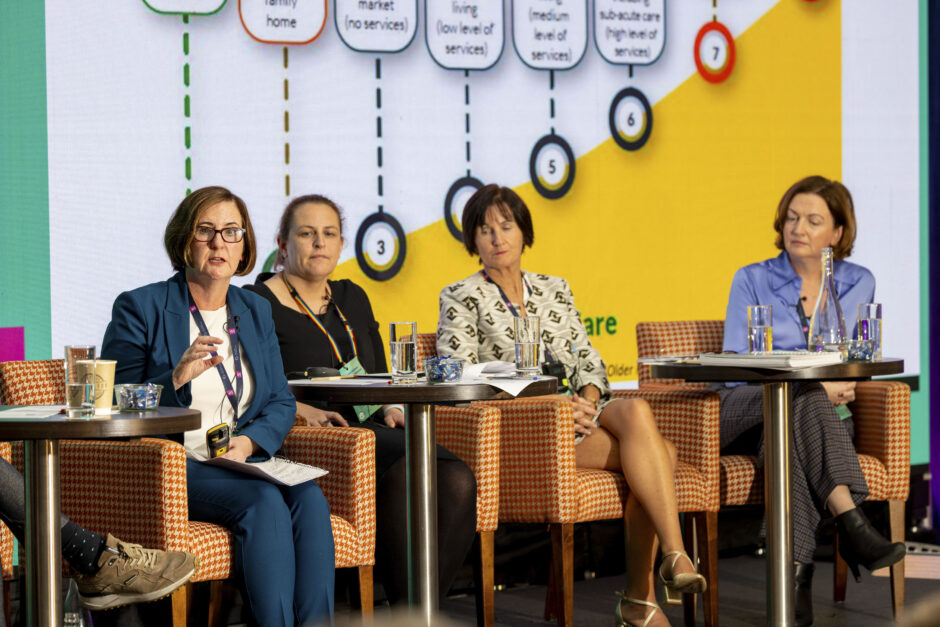
3.45pm – 5pm Parallel Sessions
European funding options – innovation to support delivery and energy efficiency
This parallel session looked at the existing funding landscape available through European programmes to deliver housing, services and upgrades to existing stock. Sorcha Edwards, General Secretary of Housing Europe gave delegates a high-level picture of the funding mechanisms that are available to social and affordable housing providers across Europe and the relatively low take up in Ireland of such funding despite the opportunities it offers and the relative advantage Irish organisations have in that these programmes are delivered through English. Jose Ospina, Chair of Carbery Housing Association and David McCourt, Director of Asset Management & Property Services with Co-Operative Housing Ireland outlined their experiences in applying for and delivering innovative projects to improve their housing stock and enhance the skills and knowledge of their organisations through involvement in European funding programmes. While both were at different points of their involvement with such funding programmes, both spoke compellingly about the benefits it has brought to their work and their organisations and how being open to forming new partnerships and taking new opportunities can lead to tangible benefits for housing providers, tenants and communities. Finally in this session, Emily Nelson, European Programmes Officer with The Wheel outlined the huge range of supports available to the voluntary and community sector through their Access Europe initiative. This programme aims to demystify the European funding landscape and helps match organisations interested in European funding with the right funding programme and partners. Throughout this session delegates were encouraged to explore the opportunities available through European funding as well as the supports that are now well-established to help find appropriate partners and funding mechanisms.
Chair: Catherine McGillycuddy, Development Specialist, ICSH
- Sorcha Edwards, Secretary General, Housing Europe
- Jose Ospina, Director, Carbery Housing Association
- David McCourt, Director of Asset Management and Property Services, Cooperative Housing Ireland
- Emily Nelson, European Programmes Officer, The Wheel
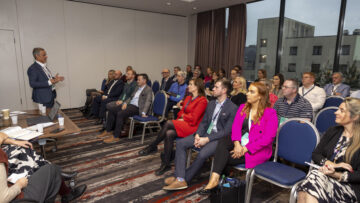
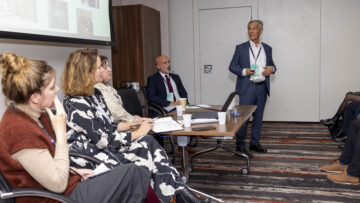
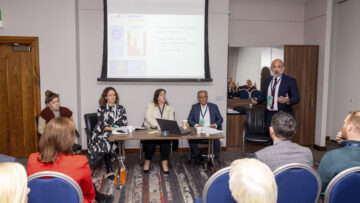
Supporting funding options for supported housing
Chair: Aisling Browne, Senior Executive Officer, Dublin City Council
- Barry O’Leary, Chief Executive, Housing Finance Agency
- Aidan O’Reilly, Principal Officer, Department of Housing, Local Government and Heritage
- Tina Donaghy, Director of Development, Fold Ireland
- Fiona O’Driscoll, Financial Lead, ICSH

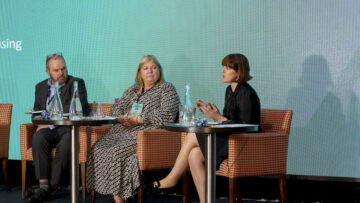
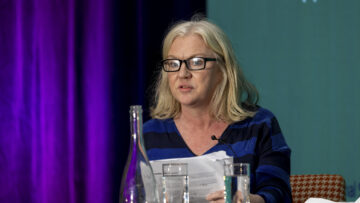
Communicating the sector’s message to shape policy
Chair: Ailbhe McLoughlin, Director of Policy, ICSH
- Fergal O’Brien, Director of Lobbying and Influence, IBEC
- Eoin Carroll,Director of Policy and Communications, Co-operative Housing Ireland
- Cllr Alison Gilliland, Councillor, Dublin City Council
- Alan Corcoran, News Editor, South East Radio
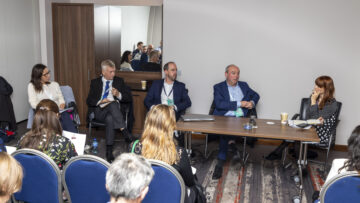
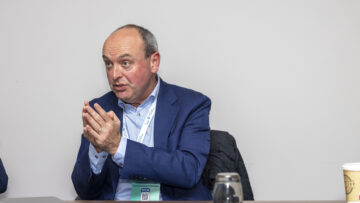
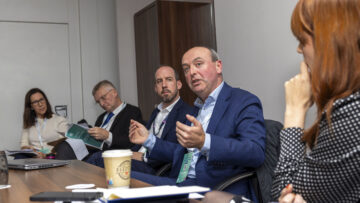
Asset management, legacy housing stock and securing the future
This parallel session featured inputs on current challenges from the AHB sector in terms of funding legacy units into the future and also inputs from the private sector and local authorities on approaches being taken to enhance data collection and evidence-based decision making in this area. A discussion was then held on some of the challenges in both the local authority and AHB sector in terms of planning for appropriate asset management given constraints such as funding and rent levels.
Chair: Lyndsey Anderson, Housing Policy Specialist, ICSH
- Steven Sheridan, Head of Communication and Performance, AHBRA
- Ray Fanning, Company Treasurer, Respond
- Dave Elliott and Shane Furner, Operations Directors, Impart Links
- Laurence Lett and Jennifer Doran, Project Co-Ordinators, Housing Delivery Co-Ordination Office

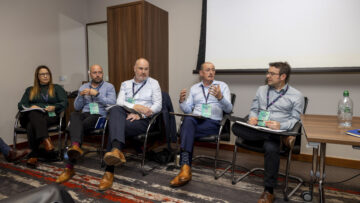
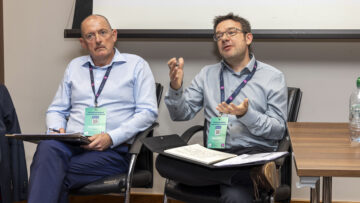
Thursday 19 October
9.30am Delivering on affordability and cost rental
The fourth session Delivering on affordability and cost rental focused on the pressing issue of delivering and scaling up cost rental and affordable purchase housing output. Representatives of the key agencies and sectors involved in facilitating and delivering such housing participated in this session and gave their expert input. Bob Jordan, Chief Executive of the Housing Agency and Declan Hayden, Stakeholder and Public Engagement Manager with the Land Development Agency outlined the structural and policy frameworks that were facilitating more delivery and overcoming previous viability challenges. Robert Burns, Chief Executive of Monaghan County Council and John Cotterell, Head of Housing Management Services with Clúid Housing outlined the perspectives of local authorities and approved housing bodies in delivering and managing affordable and cost rental housing with a strong discussion on the role of mixed tenure housing in affordable and cost rental housing schemes, as well as debate on where cost rental housing sits within the housing landscape and how it is seen and understood by wider society. Engagement from the audience was very strong with a huge number of questions coming in to the panel through Slido which were handled by the session’s chair, Eddie Taaffe, Director of Services, Wexford County Council.
Chair: Eddie Taaffe, Director of Services, Capital Development, Wexford County Council
- Bob Jordan, Chief Executive, Housing Agency
- Declan Hayden, Stakeholder and Public Engagement Manager, Land Development Agency
- John Cotterell, Head of Housing Management, Clúid Housing
- Robert Burns, Chief Executive, Monaghan County Council
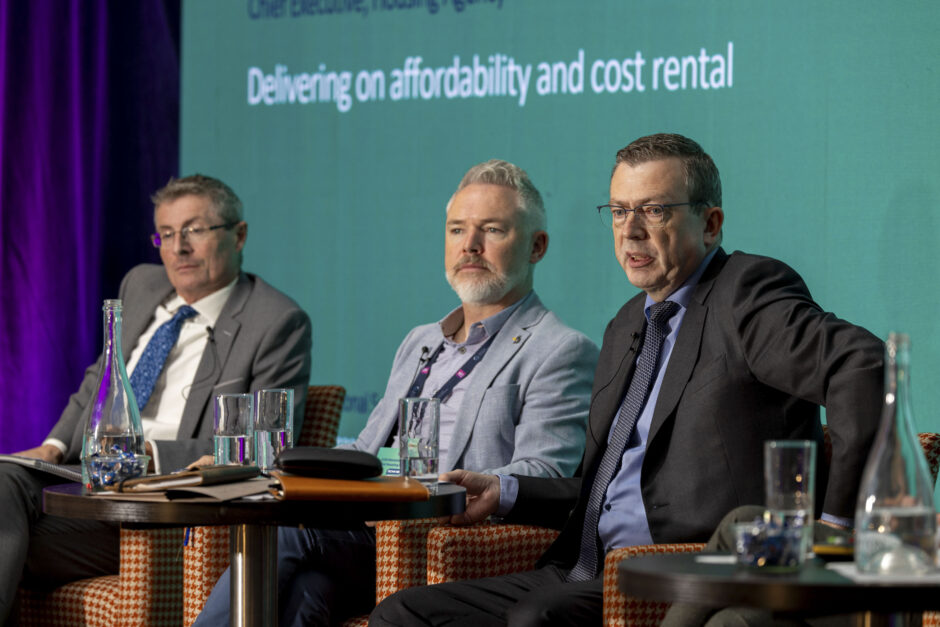
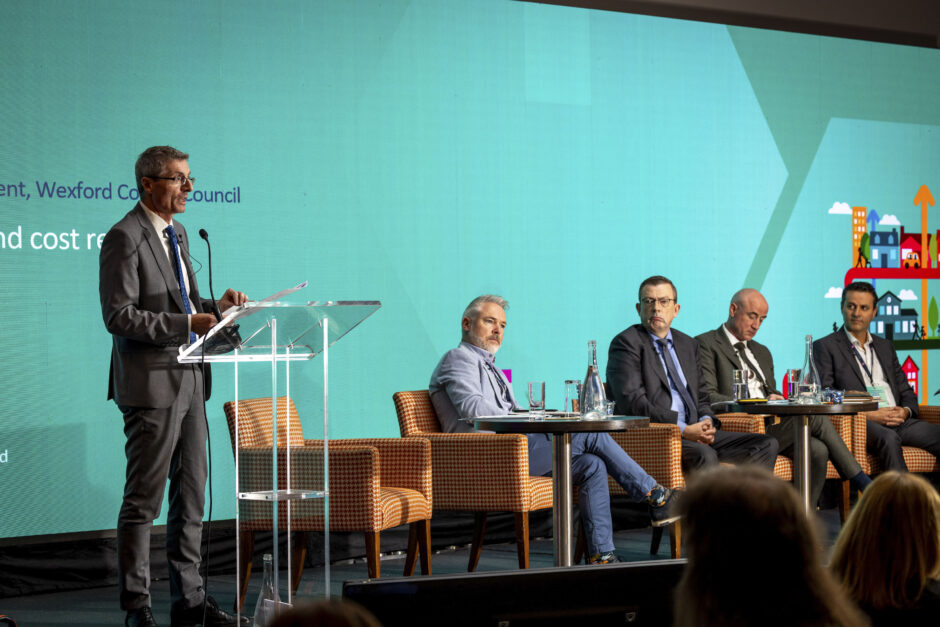
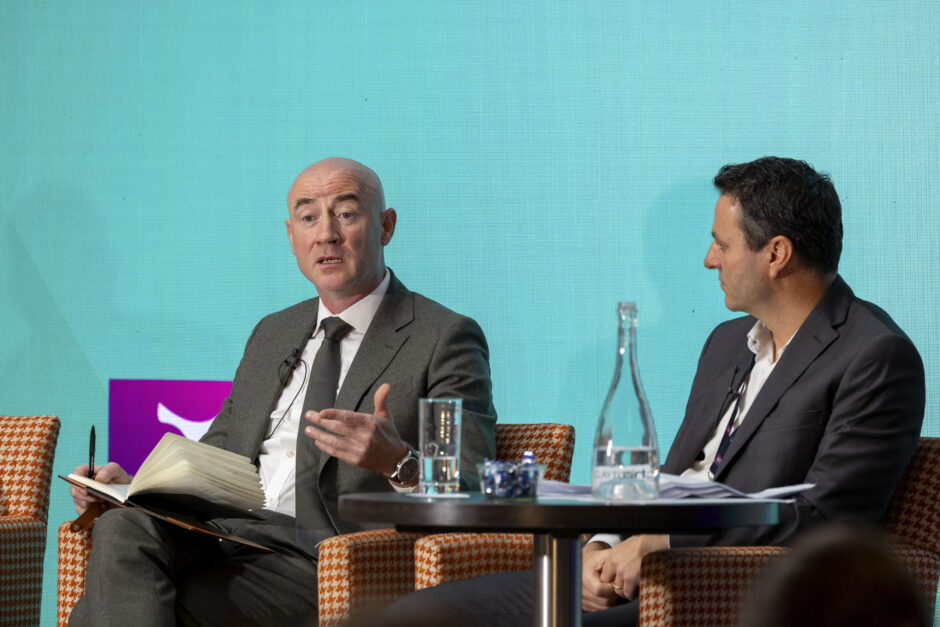
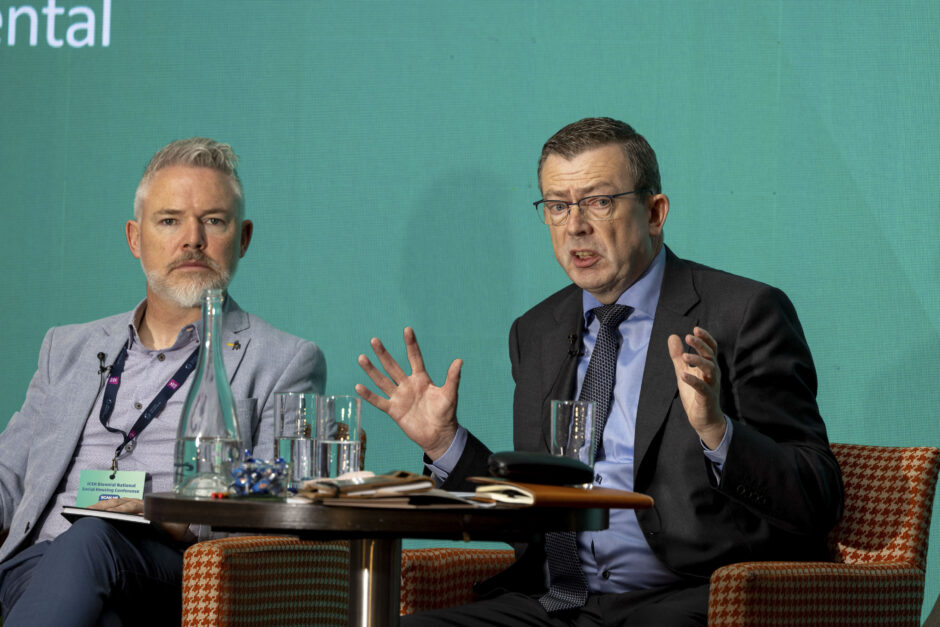
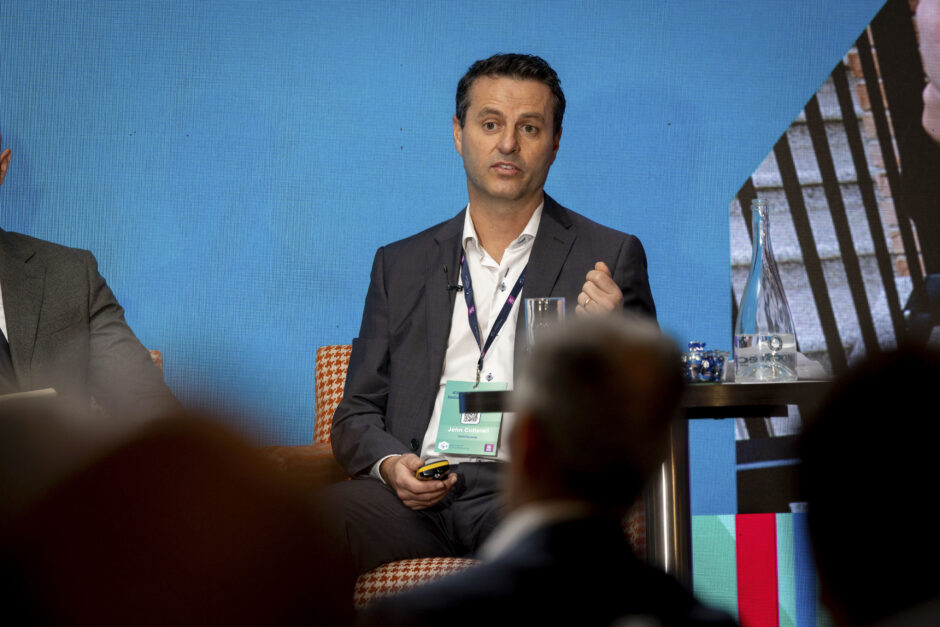
The future of the AHB sector – direction, organisation and regulation
The fourth session The future of the AHB sector – direction, organisation and regulation began with Aine Stapleton presenting on the scale of delivery to 2026 and, with a housing delivery lens and planning focus, she highlighted that targets have been reached through the collective efforts of the sector, with 30,000 new build social homes still to be delivered to 2026. She said that dedicated funding and a vision of where we need to be by 2030, also gives the construction industry a good line of sight of where the state will be as a player in housing delivery. She said in terms of the AHB delivery and capacity, the big ticket issues were organisational capacity, sustainable funding, scale and timeliness in delivery and AHB additionality that moves away from turnkey reliance. Michelle Thunder spoke about the profile of residents and clients of SJOG who are disabled. Michelle flagged that 1,571 people with a disability are living with parents who are over 70 years old. There are no care pathways for theses people with ageing parents. Michelle said the new disability strategy requires partnerships and that HSE support packages are required alongside suitable housing. HSE are crucial to delivering supported housing. She called for larger AHBs to set aside part of their delivery for disabled people. Michelle identified that having a regulator with an eye on the housing with care model was important. John Hannigan said that, looking 10 years into the future wasn’t enough. a 40-50 year vision for the AHB sector is important. Reflecting on his 30+ years in housing, he said the sector is only now realising its capacity. He said that risk-taking has also been a feature and that it needs to be done within a regulatory framework. Both John and Michelle raise the issue of multiple regulators within the sector ‘not talking to each other’. John flagged the importance of business expertise on AHB boards and challenged the contention that there are too many smaller AHBs, flagging the importance of localism and the capacity of multiple agile (not slow and monolithic) organisations to deliver. But balancing community with economy of scale is important. In relation to new housing, John said that we are currently experiencing a housing emergency. But the 54,000 units already in AHBs ownership and management also need investment now. John raised the idea of paid board membership in the sector as well as for profit housing bodies, ‘profit for a purpose’, a consideration for the future. Finally John spoke of the amplification of the tenant and the impact of their voice in the day-to-day work of AHBs. Susanna Lyons said that, looking forward, the AHB sector will continue to be at the heart of the social housing delivery. Today the sector has 54,000 homes, €7 billion in assets, €1.7 billion in income, 450 AHBs registered, of which eight AHBs have 70% of the stock. Susanna told delegates that €1 billion of AHB income was about care and support and not housing. 23,000 staff are working the sector with 9% of staff working in areas directly related to housing. So it’s a very complex and diverse sector. She flagged that the the growth plans for the sector rested with about six AHBs and that this wasn’t sustainable. She said that sectoral analysis revealed that AHBs had significant work to do to meet the regulatory standards. SH said we also needed clarity from government of what an AHB is and what government wants the sector to do. She flagged that domestic violence organisations (for example), who aren’t really in the business of building housing, are required to meet AHB standards to access funding, setting an unrealistic expectation of these organisations and their volunteer board directors.
Chair: Éadaoin Ní Chléirigh, Director of Development Operations, ICSH
- Aine Stapleton, Assistant Secretary, Department of Housing, Local Government and Heritage
- Susanna Lyons, Chief Executive Officer, AHBRA
- Michelle Thunder, Chief Executive, St. John of God Housing Association
- john Hannigan, Chief Executive, Circle Voluntary Housing Association
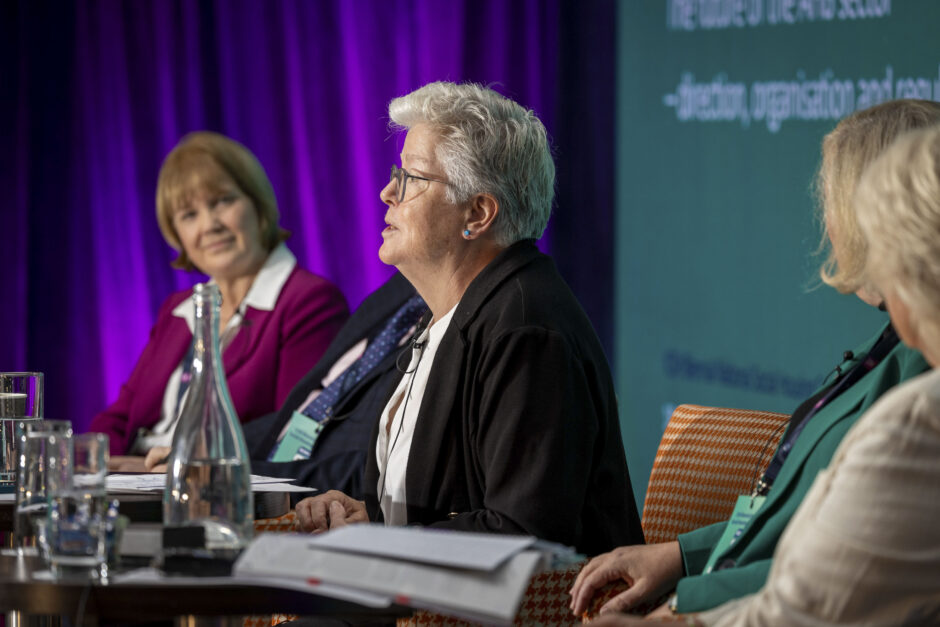
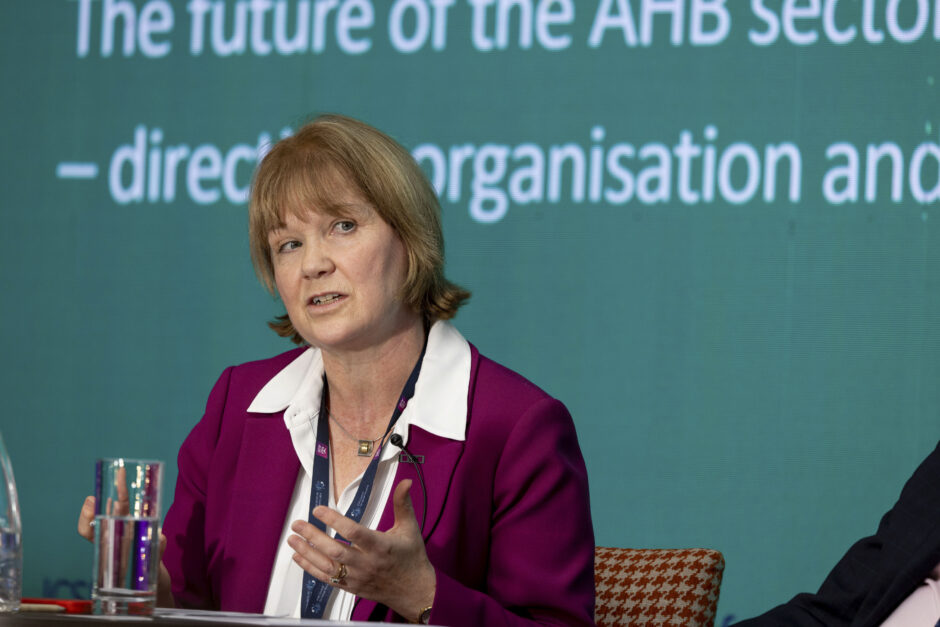
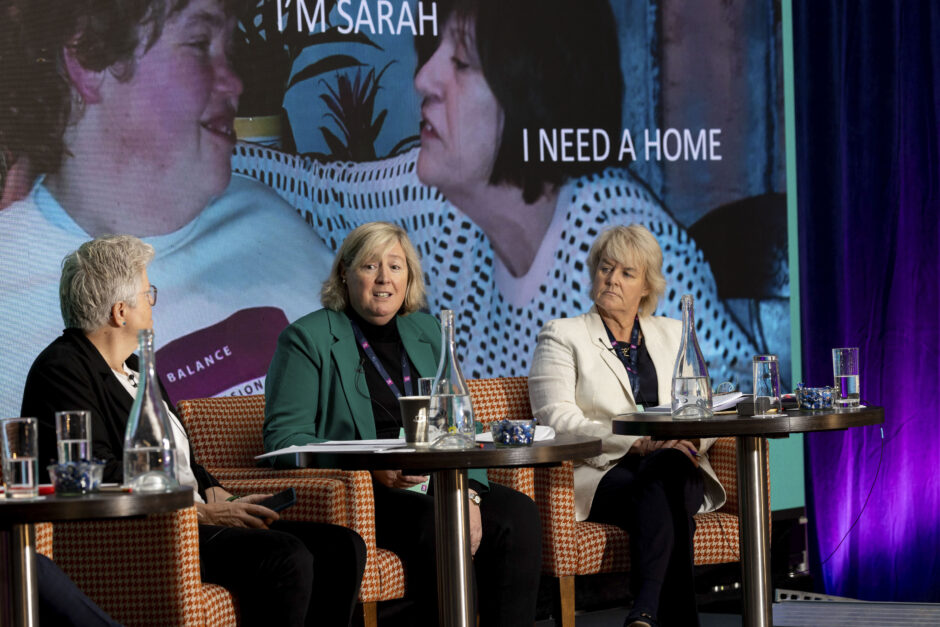
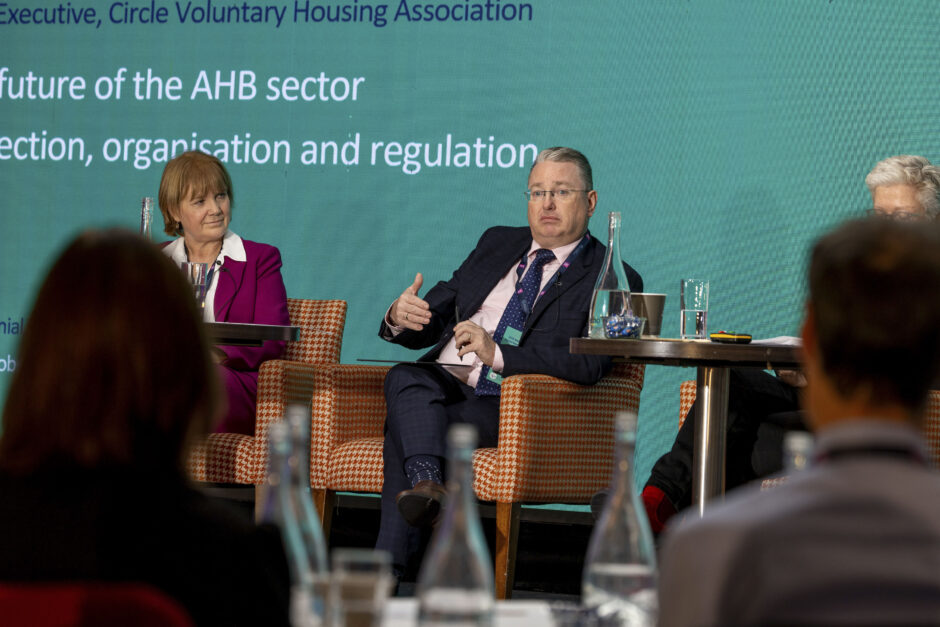
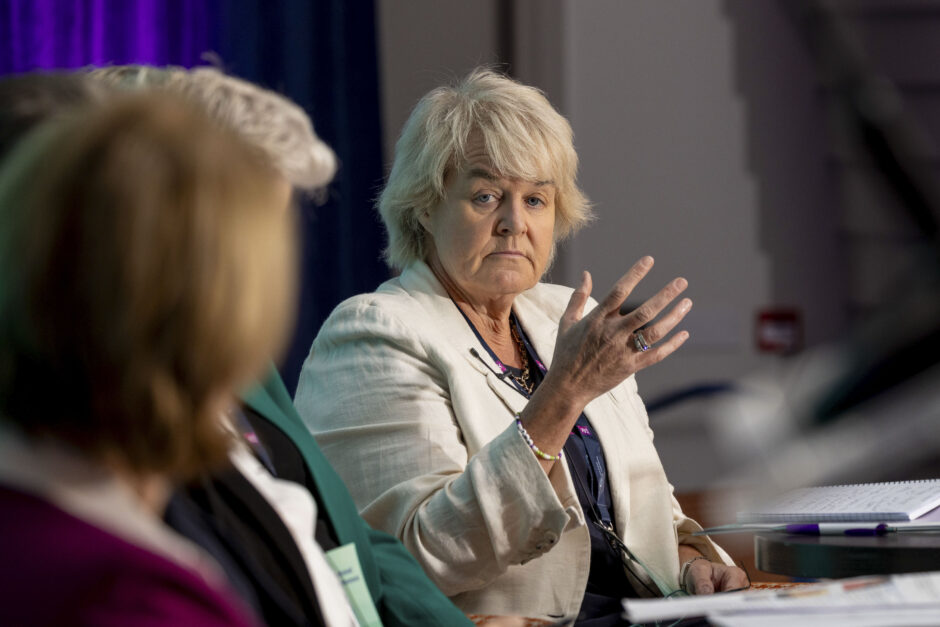
1pm Closing address, Donal McManus, CEO, ICSH
Donal McManus, ICSH CEO, closed the conference expressing appreciation to all 400+ delegates attending. He said that Placemaking is a common theme and is not theoretical. We are all involved in it. We have to deliver numbers and also communities. If they are not sustainable in the long term, it will be a drag on us. He said that the previous session focused on the mechanics of delivering in the future. He said the AHB sector was driven by funding schemes: special needs initially, and having since moved to general needs. We’ve gone from 1/5 to 1/2 of all social housing delivery. But we need the policy and regulatory framework to support this. Reflecting on the conference, he said that housing management issues didn’t come up much but there was a lot discussion on stock legacy issues. Donal suggested that maybe a space for housing management could be created in the Department of Housing. Donal also raised the the need for digital progress, moving from 2D to 3D as we map-out and plan the communities we’re developing. Donal thanked speakers and ICSH staff, particularly Catherine McGillycuddy for conference programming work and Jill Young for managing the Community Housing Awards 2023.


